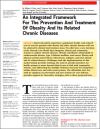Research
STOP analyzes and publishes data related to coverage and the costs of obesity, including direct medical and employer-borne costs, but also those related to stigma and bias that impact quality of care. Click the topics below to explore this content.
Coverage for Obesity Care
- Coverage for Obesity Prevention and Treatment Services:
Analysis of Medicaid and State Employee Health Insurance Programs -
The STOP Obesity Alliance partnered with the Obesity Action Coalition to analyze how states are covering the treatment of obesity in their Medicaid programs.
Read 2024 Medicaid Obesity Treatment Coverage Report
Read the 2020/2021 SEHP Coverage Report
Obesity Quality Measures
- Quality Measurement Gaps and Future Directions in the Assessment of Obesity
-
"The disease of obesity continues to increase in prevalence and severity yet obesity care, treatment, and coverage are scarce. Progress has been made in the development and implementation of quality measures in clinical practice and organizational performance. However, major gaps and limitations exist in the context of measuring guideline-based clinical care for obesity."
Read the Quality Measurement publication
Assessing Provider Knowledge and Attitudes
- Explore STOP Obesity Alliance Research
-
The DocStyles web-based survey instrument, developed and administered by Porter Novelli, contains 144 questions designed to provide insight into health care professionals’ (HCPs) attitudes and counseling behaviors on a variety of health issues. Beginning in 2015, STOP purchased space to include a handful of obesity-specific questions to assess HCPs’ beliefs, practices, and knowledge regarding effective treatment modalities and current clinical guidelines for obesity management.
The 2016 survey assessed health care professionals’ (HCPs’) knowledge of evidence-based guidelines for nonsurgical treatment of obesity. The results indicate that most providers lack knowledge and understanding of recommended obesity treatments, such as behavioral counseling and pharmacotherapy. Providers cite lack of time, lack of reimbursement, and lack of knowledge as major barriers to treating patients with obesity. The research was published in the journal Obesity in March of 2018.
The 2015 survey found that despite the high prevalence of obesity among U.S. adults, provision of intensive behavioral counseling, pharmacotherapy, and bariatric surgery remains low. STOP researchers published two articles with results from the 2015 survey.
Visit: "Health care providers' attitudes and counseling behaviors related to obesity"
Visit: "Current Knowledge of Obesity Treatment Guidelines by Health Care Professionals"
Download: "Current attitudes and practices of obesity counselling by health care providers" (PDF)
Integrated Framework for Care
- An Integrated Framework for the Prevention and Treatment of Obesity and its Related Chronic Diseases
-
STOP Director, Dr. Bill Dietz, published an article in Health Affairs in 2015, along with a group of co-authors with expertise in research, clinical care, health policy, and public health. The article offered a new model for addressing the obesity epidemic, one that reaches beyond clinical intervention to include community systems as well. The paper proposes a modern framework, integrated in its approach to address both the prevention and treatment of obesity and its related chronic diseases. Accompanying the article is a figure which illustrates this proposed framework.





